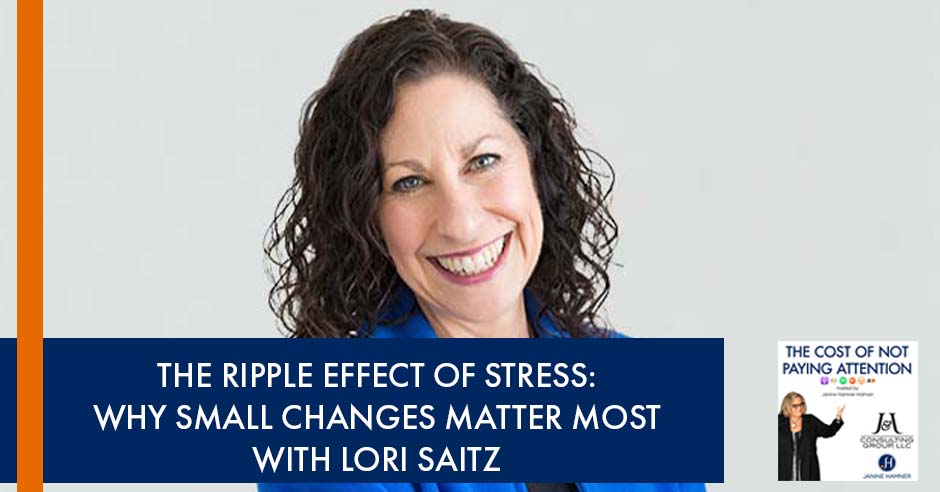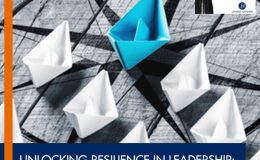
Stress can be a silent thief, robbing you of your health, happiness, and even your ability to think clearly. What if you could take control? In this episode, Janine Hamner Holman sits down with Lori Saitz, founder of Zen Rabbit and host of the podcast Fine is a Four-Letter Word, to explore the profound effects of stress on our lives. Lori dives deep into how stress, often underestimated, can manifest in various ways—from sleepless nights to strained relationships—and eventually lead to serious health conditions like heart disease and diabetes. Gain practical wisdom to navigate life’s challenges with greater calm and clarity, empowering you to respond thoughtfully rather than react impulsively to stressors.
GUEST: Lori Saitz | LinkedIn | Visit their Website: ZenRabbit
HOST: Janine Hamner Holman | Janine@JandJCG.com | LinkedIn, Facebook, and Twitter | Subscribe to my Newsletter! | Book me to Speak!
—
Listen to the podcast here
The Ripple Effect Of Stress: Why Small Changes Matter Most With Lori Saitz
Introduction
I meant to ask you, Lori, before we started, how do you pronounce your last name?
It’s Sites, like set your sites.
Sites, take that out in post. Lori Sites is the founder and CEO of Zen Rabbit and the host of the podcast, FINE is a 4-Letter Word. As the CEO of a forward-thinking health and wellness company, she is dedicated to guiding organizations towards nurturing healthier and more productive work environments. She has a comprehensive background in both wellness strategies and employee engagement, which enables her to carry out her mission, which is to help businesses implement programs that not only improve the well-being of their teams but also contribute to their bottom line through increased performance and reduced absenteeism. Welcome to the show, Lori.
Thanks so much for having me.
The Impact Of Stress
I’m so thrilled to have you here with us. Lori, tell me, what is the one thing that you have realized either in your own business or working with clients? What’s the one thing that they have been failing to pay attention to, what’s the cost of that inattention, and what’s the problem that that inattention is causing?
The biggest thing people aren’t paying attention to is what the results or what is stress causing? I can’t sleep, I’m barking at my kids, or I’m arguing with my partner. You see those things, but that’s life. That’s how it is. They’re not paying attention to all these little things, and the body keeps track of things. As we get older, things accumulate until it’s like being hit over the head with a two-by-four.
You must pay attention. It comes out in a lot of ways for different people. When you look at the overwhelming number of people who have cancer, heart disease, and diabetes, all these things are caused in large part by stress. People say it’s genetics, but it’s much more environmental and stress. That’s what people are not paying attention to. They think that what I’m teaching is simple things that you could do to counterbalance that.
They think that must be too simple. The biggest thing is that people are not paying attention to the small things, and the small things add up to become very large things.

Stress Management: The biggest pitfall is that people are not paying attention to the small things. They add up to become very large things.
I love what you’re talking about. It had me thinking back, a couple of decades ago, I was working for an organization, and we had a lot of circumstances. There were a lot of things going on, and a number of them involved, in either one way or another, me having to help solve them or being tasked with figuring out the solution to a big change management opportunity or something else. A lot of these things were coming back to me, and I ended up getting whipping migraines. My back went out, and then I got a yeast infection, which was the only time in my life I ever got a yeast infection. I got two back-to-back. I got over it, and then I got another one.
I remember thinking, this is not a confluence of weird things that have never happened to me before that are all happening at the same time. This is my body telling me there’s a problem. I was continuing to not pay attention to my body telling me there’s a problem in the way that I was managing myself in the face of all of these challenges. When I think about the water that many of us are swimming in these days, how fast things are changing. I recorded a podcast episode.
Our last episode was an interesting one. If you haven’t heard it, please go back and listen to it. It was with Dan Echelman, the CEO of a company in Canada. He was talking about how he has intentionally created the culture in his organization to be people-centric. We got into talking about all the stresses and challenges that are not only on CEOs but everybody in an organization because of how COVID accelerated so many things that were already happening in the workplace. A lot of their workforce is remote.
How do you build a culture of inclusion and connectivity when eight-tenths of your people aren’t ever around? There are so many things that are going on in our world that produce stress, and stress is one of those tricky words. I would love it if you would unpack this a little more after I start unpacking it a teeny bit. We have it that stress is also, even though it’s a five-letter word, we have it that it’s a four-letter word. All stress is bad.
In fact, we need stress in our life to get anything done, and we need stress to get out of bed. Stress is a part of life. We’re dealing with more stress right now than maybe we’re built for. The question is about how do we manage ourselves in the face of that stress? I see you smiling and nodding at me because even though you all are hearing this as a recording, Lori and I are recording it, being able to see each other. Tell me more about the role of stress and what we do about all this stress.
Stress is how we interpret what’s happening, which defines whether it’s stressful or not. I was having a conversation earlier today with a friend who called, and she was in a panic because of a medical condition. She immediately went, “Oh my God, I’m dying.” She hadn’t even been to the doctor yet. She called me after, and it turned out to be virtually nothing, something that could easily be cured with some topical steroids. She went to the far extreme of horrible. I was like, “Why is that your first response?” People respond and react differently, like those are two we can talk about. You can choose to react instinctively with the reptilian part of your brain, which is what she was doing.
Stress is defined by how we interpret what’s happening. Share on XRight.
I’m going to die, or you can choose to respond like, “Okay, this doesn’t look good.” Let me go to the doctor and see what’s happening.
Right.
Choose not to panic. I was going to say, choose not to panic until it’s worth panicking about, but it’s never worth panicking about because that doesn’t serve the situation. I’m not saying don’t feel emotions around it. If it was something horrible, then you have the right to feel whatever emotions are going to come up around your feels. What I’m saying is there’s always going to be stress, but people interpret things differently. Some people can handle something small, and it throws them into a complete tizzy, and other people can have tornadoes spinning around them, and they are the calm in the eye of the storm, but that doesn’t mean they’re not feeling this.
They don’t feel they’re responding. They’re choosing to respond differently. Starting with the idea that everyone is experiencing stress. Different people respond and react to it differently. You are never going to be able to necessarily change circumstances. What’s happening is happening. Acknowledge and accept it. Again, you get to choose how you respond.
Your response changes the circumstance. Maybe I misspoke in saying you can’t change the circumstances. You can’t necessarily change what’s showing up, but you can change the situation by staying calm. If you’re a leader and you are in the midst of a storm and everybody sees you staying calm, then that tends to help them stay calm. Whereas if you’re like, everything’s on fire, everybody’s going to panic.
I love this distinction that you’re creating between how we react to something versus how we respond to something. I can think of a client right now who’s in the real estate industry, and everybody in the real estate industry is perpetually running around with their hair on fire, and everything is an emergency. The CEO of this company has declared to his team, we decide what’s urgent and important. Just because somebody else is running around with their hair on fire does not mean that our hair has to be on fire. We got into this conversation because so many people were running around with their hair on fire inside of his organization.
Overlooking things that needed to happen for their clients, or dropping balls, or working until midnight, all of these symptoms of a problem. He decided to declare no, just because they’re running around with their hair on fire doesn’t mean that we have to pick it up. I work with a coach, and she says to me, just because they’re putting it down, doesn’t mean you have to pick it up.
It also has me thinking about my husband, who is in a situation right now with some circumstances. His mother is undiagnosed with dementia but very clearly has dementia. He said the other day, he’s like, I need my circumstances to stop. I said, “I get that feeling, honey.” We had gone down last weekend and spent a number of hours with her, and because of this illness and the aging process, she’s also 91, she’s now calling him multiple times a day and doesn’t remember that she’s called and all of the things that happen.
He was saying things like, “I need to extricate myself.” I said, “Okay, I guess you could do that. Never speak to your mother again.” Then she’ll pass on from this world, but you love your mom. I know that isn’t what you want to do. It might feel easier. I would encourage you to give a call to the Alzheimer’s Foundation, and they have all kinds of support groups where other people are dealing with these same things, and you can practice your breathing techniques.
Managing Stress
It’s so easy for me to say that it’s something else to be in the middle of it. For him, with all the emotions around it, he’s not had an easy relationship with his mother these last 60-some-odd years. He has a lot of feelings. When we’re in a situation where we’re feeling victimized by our circumstances, we would like these circumstances to be something very different, and we have a lot of feelings about these stupid circumstances.
What are some practical tips that you can give our listeners, including my husband, in terms of how we manage ourselves in the face of whatever the stress is that we’re dealing with that we don’t like? We have feelings about it that are not very good, and we have some negative emotions about these stupid stressors. We’re in a state of being more reactionary than being easily able to access our ability to respond in a great way.
I’ll give you three tips. One, breathe, focus on your breathing, and you don’t need to sit for an hour, cross-legged on a mat with no thoughts in your head. Take even 90 seconds, three minutes, 90 seconds, five minutes, whatever you want. It doesn’t have to be a long time. Sit and breathe, pay attention to your breathing. Feel and breathe all the way in down through your abdomen, like babies breathe. They breathe through their abdomen, but they go with their whole torso.
People tend to, adults especially, breathe very shallowly, which also contributes to feeling stress. When you’re breathing shallow, your body’s not getting enough oxygen. Take 90 seconds or three minutes and focus on the breath coming in and going out. Every time thoughts come into your head and start trying to steal your peace, because they will.
Right.
Bring yourself back and don’t beat yourself up. When your thoughts are wandering, return to focusing on your breathing. You can practice this even during a meeting. You could do it in any situation. Not something other people are going to notice. Something you could do very quickly and what’s the word I’m looking for? Surreptitiously, like nobody’s going to notice.
Secondly, accept. It’s hard, but you cannot change what’s happening. He can’t change what’s happening with his mother. You can’t change what’s happening with the client, whatever the situation is. You may be able to change it at some point, but right this second, this is what is, and the harder you fight against it. What you resist persists, and what you accept you can change.
Accepting. We’re not saying ignore your emotions again. I don’t like this situation. In fact, I hate it. It sucks. Maybe go back into the breathing for a second. This is what I’m dealing with. Again, that gives you the opportunity to respond and figure out, maybe you don’t, in the case of your husband’s situation, since we’re using that as an example, tell him to talk to her mother every other week or go visit her every month instead of every week, or like what would make this easier, but not without having to remove yourself completely.
The third thing is where’s the gratitude? It’s there. Even when it does not look like it’s there, like everything’s blowing up. I don’t see any good in this situation at all. I guarantee you it is there. If you are in a situation where you cannot find one shred of gratitude, I invite you to call me, and I will help you find it. I guarantee it. Some people will say, write it down, which is a great idea. Even if you don’t want to take the step, I have to get a piece of paper and a pen, find where you can find gratitude. Once you start looking for it, like it could be, “Hey, I’m glad this didn’t happen sooner, that I’ve had 91 years with her.”

Stress Management: Find gratitude. It is there even when everything feels like it’s blowing up.
I’m glad that she is safe. She’s in a safe environment. I’m glad that I have Janine to be my partner to help me with this. It’s there, and those three things will change the situation and change how you’re responding to the situation right away.
The Power Of Breathwork
Let’s come back for a minute to breathing because it is something so fundamental. I know one of your superpowers is to translate things that might seem woo woo into things that are super practical. One of the things that I know about breathing is that what we are actually doing with breathing is part of why taking a deep inhale breath and even holding it for a couple of seconds, and then letting it out slowly, often more slowly out than it came in. It’s one of the techniques to slow us down.
If you want to amp yourself up for something, you’re going to go do a presentation, or you’re going to go do a talk. You’re going to go talk to somebody for whom you need to be up and on. You want to reverse it. You want to breathe in slowly and out quickly to help amp you up. Usually, what we want to do is the other way around. We usually want to slow ourselves down. What’s happening chemically in our brain is that I know that if we’ve got thrown into our limbic system, which is where fight-flight-freeze resides.
We’re operating out of instinct now and not out of actual cognition. We’re not thinking anything. We’re acting, and taking that deep breath literally resets our brain because our brain knows if I can breathe like that, there’s not a tiger. Like I can’t breathe like that and run fast at the same time. Our brain knows. Either the danger has passed because that part of our brain, our limbic system, got developed before humans had speech.
That part of our brain only knows danger equals tiger equals run. One of the things that I’m curious about, your take on this, I’ve never talked about this before on the podcast, but I have a hunch, this is not a scientifically proven fact, but I have a hunch that because we are under so much stress and because we are in such reactive reactions so perpetually in our lives these days, one of the things that happens when our brain gets thrown into our limbic system fight, flight, freeze, in order to enable us running away faster than everybody else, because it doesn’t matter if we run faster than the tiger, we have to run faster than anybody else. The tiger eats them and not us.
One of the things that happens is that systems in our body shut down. If you’ve ever been in an argument with somebody and it got heated and you got flipped out and triggered, one of the things that often happens is I’m the person that got triggered. I lose my appetite. That happens because our digestive system shuts down because we don’t need to digest food. We need to run.
The other thing that happens is our reproductive system shuts down because we don’t need to be having no babies right now. We need to run. We’re not making babies. My hypothesis is that so many of us, men and women both, are having issues around reproductive challenges because of the amount of stress that we’re under. How much that throws us into fight, flight, freeze, and we’re in this perpetual fight or flight situation. Lori, what are your thoughts?
I would agree with you. I don’t know of the scientific research around that either, but I totally agree because when you’re in this fight, flight, freeze response, and when you are constantly feeling stress, your body is being flooded with cortisol, which is the stress hormone that the body releases. We were designed as humans to have that cortisol release, but then have it stop after you’ve run away from the tiger and you’re in safety now.
In our modern society, it never stops. It’s a constant flood. It’s always flowing through your bloodstream, and we’re not designed for that. The body doesn’t know how to process that and how to clear it. This also causes inflammation in the body. There are studies on this. I know the studies on this, that when your body is constantly under stress, it produces inflammation responses, and that inflammation response is again, what is responsible, even more specifically, what is responsible for causing disease in the body.
It comes from what we eat, how we respond to situations, and constant stress that we see. It makes perfect sense that reproductive or any other functions of the body are not working properly.
I want to come back to breathing because it’s the easiest thing for, and as you were saying, we can be stealthy about it. Nobody has to know that we are doing our breathing exercises if we’re in the middle of a meeting and we’ve got triggered. Are there different kinds of breathing techniques that help people learn in order to manage themselves or this one might work for this person and this other one might work for this person? Are there different ways of learning how to breathe better?
It’s funny. It makes me laugh to learn how to breathe better, like if you’re not breathing, you’re not alive. It’s the most basic thing that you could possibly do. Yet most of us are not doing it properly. It’s keeping us alive, but it’s not enabling us to thrive. There are lots of different breathing techniques, but the thing I think that is most important is to be conscious of taking those deeper breaths instead of being in that shallow breathing. Because when you’re doing that, you’re telling your nervous system, “It’s okay. Calm down.”
You’re flooding your body with oxygen, your body and your brain. When your brain is not getting enough oxygen from breathing shallowly, you can’t make good decisions. You can’t be everything that business depends on creativity, innovation, good decision-making, and focus. You can’t do any of those things. When you’re super stressed, you’re not breathing properly. What I love teaching people about is how to use this technique, this practice that the majority of the most successful business leaders in the world use. Do you know what it is?
When your brain is not getting enough oxygen from breathing shallowly, you can't make good decisions. Share on XI’m not 100% sure that I do. Is it something called meditation?
It is. It’s so interesting to me that so many high-level, high-performing business leaders practice it and attribute it. They’re not hiding that they practice meditation. The days of meditation being a closet method of thing, like, “Oh my God, people are going to think I’m so woo woo, but I need to go out and raise a hundred million dollars in this IPO, whatever.”
I can’t tell anybody those days are gone. These are leaders like Ray Dalio, who is a Wall Street icon, and Richard Branson at Virgin and Ariana Huffington. These people are not afraid to say that they attribute a large majority of their success to meditation. That’s not to say that they sit on their couch and meditate all day and success happens. What it says is, it doesn’t, there’s action to be taken, but it’s inspired action and it helps them to, when you’re sitting in and meditating, you are a lot of times focusing on your breath. It is helping you calm your entire body.
Again, it’s not about doing it for an hour a day. Some people do it, that’s fine, but some people do 5 or 10 minutes a day and that’s all you need. When you practice meditation, it carries over to every other part of your day when you’re not in meditation. That’s what I think a lot of people don’t realize is like, I don’t have time or I’m not good at it. That’s a whole other conversation, but the ten minutes that you might spend in a meditation is going to help you be more effective the rest of your day.
Something that might’ve taken you two hours now only takes you an hour, but you only spend ten minutes in meditation. Basically, you bought yourself 50 minutes. That’s how the math works there and benefits can show up almost immediately. They are immediate and they take over time. You can see, you will see them both over time and immediately.
I am a human who has tried at various times to meditate. Janine, do you meditate? I would say, “No, I suck at it.” I don’t think I know I am not alone in that. I have tried both, sitting quietly by myself and acknowledging the thoughts when they come in. Letting them go and coming back to my breathing, in all good things and breathing out everything that no longer serves me. I’ve done guided meditations. If there are failed meditators who are out there who have tried it in the past and think, “I can’t meditate or I’m bad at meditation.” How would you suggest that we take our first step again into this domain?
I would first suggest reframing what you think meditation is, because it is about clearing the thoughts in your head. What it’s about is getting in touch with that inner voice, getting quiet enough to hear what is your inner truth, that voice that only you can hear, what is it telling you? We keep ourselves so distracted. Nobody wants to be alone with their thoughts, but what is that intuition telling you? There are a couple of things. One, if you can’t sit still and you’re feeling antsy, I would suggest putting on your favorite song, upbeat song and dancing and getting all that energy out, get it out and then sit and see if that works.

Stress Management: Meditation is about clearing the thoughts in your head and getting in touch with the inner voice.
Understanding that meditation is a practice. It’s not necessarily going to be like, you’re going to be great at it. You’re going to be sitting there, the first time or their first week and it’s taken me. I say this and I do meditate every morning now. My mom took my brother and me to a meditation course when I was ten years old.
I had that as a foundation, but I did not use it for the next 40 years and I would do it. I would meditate for a couple of days and then I’d skip a few years and then I’d come back to it for a day or two, skip another ten years. Couldn’t let some of us go to the gym. You mentioned the gym, you might’ve read my bio it says the gym is my sanctuary. The gym can be a great place for meditating because you are focused on doing the reps.
You’re focused on doing the reps. You’re not necessarily paying attention. If you’re there to work out, you’re not paying attention to what everybody else is doing around you. You’re focused. I have recently, fairly, in the past couple of years, taken up rock and indoor rock climbing, I don’t go a lot, but when I do go, when you’re on the wall, there is no room for any other thoughts. How do I get to the next hold? That can be considered a form of meditation.
Gardening could be a form of meditation. It’s wherever you can let yourself be. You don’t have all these things pulling at you and you can be in touch with that inner voice and guided. You mentioned guided meditations for people who are starting out. I would not suggest trying to sit in silence and clear all the thoughts. I think guided meditations are a great place to start because you can always bring yourself back to the meditation teacher’s voice. There are plenty of apps out there. There are lots of good ones. The one that I recommend is called Insight Timer. There’s a free version with a hundred thousand meditations on it. There’s a paid version too, if you want to do courses and stuff, but the free version is fantastic.
You can find your meditative state anywhere you allow yourself to simply be. Share on XClosing Thoughts
Insight Timer. This has been such a fun and illuminating conversation. Before we leave it, I want to check in and see if there was anything else that you were hoping that we might talk about or that you want to share with our listeners or if we did a great job and we’re complete. I think we covered a lot. Awesome.
Anybody who’s listening, if you take these tools and use them for yourself and share them with your team. All these things that we talked about help make you a better business person and a better human overall.
I want to come back to that. If you are listening and you have people in your organization who are accountable to you, I was recently working with a CEO and we created a new practice for him and he is practicing it in his office with his door open because he wants his people to know he is actively engaged in this and to take any weirdness, any shame, or any of the mishegoss that we put on stuff out of the formula. He wants people to see that he’s doing it and in part as a leader, it also creates permission for other people to be doing it too.
I love what you said, bring it to your people and make it work with an organization that begins every meeting with whoever’s leading the meeting. They say what I feel like saying. It’s what I’m experiencing in this moment. For many of us, that is a counterintuitive thing in the business world. The CEO or whoever’s leading the meeting says what I feel like saying.
Often pauses to get clear on what it is that they feel like saying, and then they say what they feel like saying, and then they turn to the next person and they say, Lori, what do you feel like saying? And then Lori would say what she feels like saying and then turn to the next person, Tom, what do you feel like saying? The first 5 or 10 minutes of the meeting is listening to what everybody feels like saying in that moment.
It gives people an opportunity to get present, which is the method behind the madness and why they’re doing what they’re doing. I love this. Bring it to your people.
All these concepts we talked about today are there have been so many studies supporting how it helps businesses. How it helps the bottom line, how it helps profitability, how it helps engagement, how it helps retention, and how it helps communication and interpersonal collaboration. All of this sounds good. Also, there are bottom line results that come from implementing all these things. I want to make sure that the people that were listening understand that this is not nice to have. This is a competitive advantage.
Lori, thank you for sharing your brilliance and your expertise. Your superpower to make things that might feel woo woo. Normal and to help normalize this, these kinds of practices that are going to serve. Ourselves as humans and our organizations and our bottom line and top line profitability and all that stuff. Thank you for who you are.
My pleasure to be here, Janine. Thank you for having me.
Until next time.
About Lori Saitz
 Lori Saitz is the founder and CEO of Zen Rabbit and host of the podcast “Fine is a 4-Letter Word.” As the CEO of a forward-thinking health and wellness company, she is dedicated to guiding corporations toward nurturing healthier, more productive work environments.
Lori Saitz is the founder and CEO of Zen Rabbit and host of the podcast “Fine is a 4-Letter Word.” As the CEO of a forward-thinking health and wellness company, she is dedicated to guiding corporations toward nurturing healthier, more productive work environments.
With a comprehensive background in wellness strategies and employee engagement, her mission is to help businesses implement programs that not only improve the well-being of their teams but also contribute to their bottom line through increased performance and reduced absenteeism.
Lori is currently living nomad life while cat sitting in states across the southeast U.S. You can often find her in her sanctuary, aka the weight room at the gym. She also loves cupcakes, Thai food, and classic rock music.





